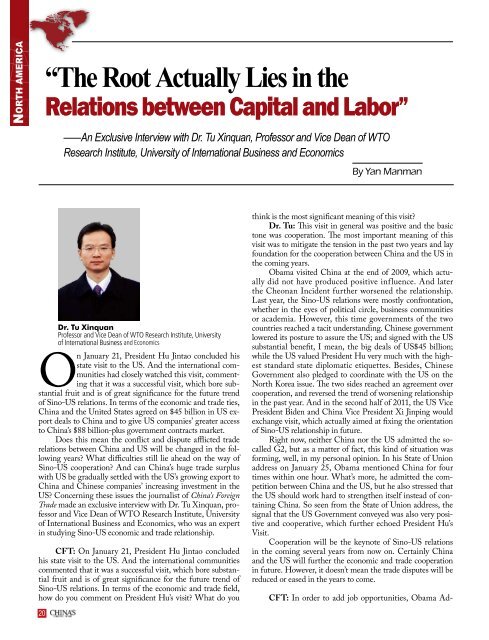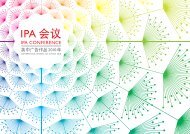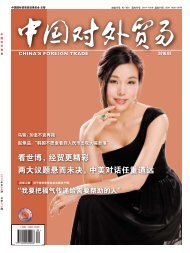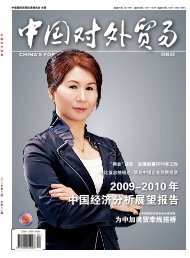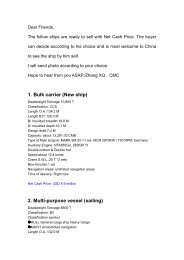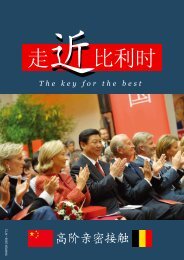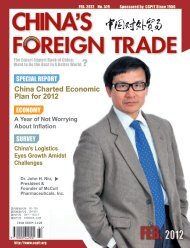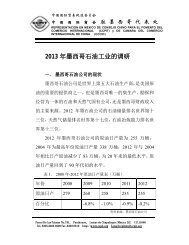You also want an ePaper? Increase the reach of your titles
YUMPU automatically turns print PDFs into web optimized ePapers that Google loves.
NORTH AMERICA<br />
“The Root Actually Lies in the<br />
Relations between Capital and Labor”<br />
—An Exclusive Interview with Dr. Tu Xinquan, Professor and Vice Dean of WTO<br />
Research Institute, University of International Business and Economics<br />
By Yan Manman<br />
Dr. Tu Xinquan<br />
Professor and Vice Dean of WTO Research Institute, University<br />
of International Business and Economics<br />
On January 21, President Hu Jintao concluded his<br />
state visit to the US. And the international communities<br />
had closely watched this visit, commenting<br />
that it was a successful visit, which bore substantial<br />
fruit and is of great significance for the future trend<br />
of Sino-US relations. In terms of the economic and trade ties,<br />
China and the United States agreed on $45 billion in US export<br />
deals to China and to give US companies’ greater access<br />
to China’s $88 billion-plus government contracts market.<br />
Does this mean the conflict and dispute afflicted trade<br />
relations between China and US will be changed in the following<br />
years? What difficulties still lie ahead on the way of<br />
Sino-US cooperation? And can China’s huge trade surplus<br />
with US be gradually settled with the US’s growing export to<br />
China and Chinese companies’ increasing investment in the<br />
US? Concerning these issues the journalist of China’s Foreign<br />
Trade made an exclusive interview with Dr. Tu Xinquan, professor<br />
and Vice Dean of WTO Research Institute, University<br />
of International Business and Economics, who was an expert<br />
in studying Sino-US economic and trade relationship.<br />
CFT: On January 21, President Hu Jintao concluded<br />
his state visit to the US. And the international communities<br />
commented that it was a successful visit, which bore substantial<br />
fruit and is of great significance for the future trend of<br />
Sino-US relations. In terms of the economic and trade field,<br />
how do you comment on President Hu’s visit? What do you<br />
think is the most significant meaning of this visit?<br />
Dr. Tu: This visit in general was positive and the basic<br />
tone was cooperation. The most important meaning of this<br />
visit was to mitigate the tension in the past two years and lay<br />
foundation for the cooperation between China and the US in<br />
the coming years.<br />
Obama visited China at the end of 2009, which actually<br />
did not have produced positive influence. And later<br />
the Cheonan Incident further worsened the relationship.<br />
Last year, the Sino-US relations were mostly confrontation,<br />
whether in the eyes of political circle, business communities<br />
or academia. However, this time governments of the two<br />
countries reached a tacit understanding. Chinese government<br />
lowered its posture to assure the US; and signed with the US<br />
substantial benefit, I mean, the big deals of US$45 billion;<br />
while the US valued President Hu very much with the highest<br />
standard state diplomatic etiquettes. Besides, Chinese<br />
Government also pledged to coordinate with the US on the<br />
North Korea issue. The two sides reached an agreement over<br />
cooperation, and reversed the trend of worsening relationship<br />
in the past year. And in the second half of 2011, the US Vice<br />
President Biden and China Vice President Xi Jinping would<br />
exchange visit, which actually aimed at fixing the orientation<br />
of Sino-US relationship in future.<br />
Right now, neither China nor the US admitted the socalled<br />
G2, but as a matter of fact, this kind of situation was<br />
forming, well, in my personal opinion. In his State of Union<br />
address on January 25, Obama mentioned China for four<br />
times within one hour. What’s more, he admitted the competition<br />
between China and the US, but he also stressed that<br />
the US should work hard to strengthen itself instead of containing<br />
China. So seen from the State of Union address, the<br />
signal that the US Government conveyed was also very positive<br />
and cooperative, which further echoed President Hu’s<br />
Visit.<br />
Cooperation will be the keynote of Sino-US relations<br />
in the coming several years from now on. Certainly China<br />
and the US will further the economic and trade cooperation<br />
in future. However, it doesn’t mean the trade disputes will be<br />
reduced or eased in the years to come.<br />
CFT: In order to add job opportunities, Obama Ad-<br />
20


